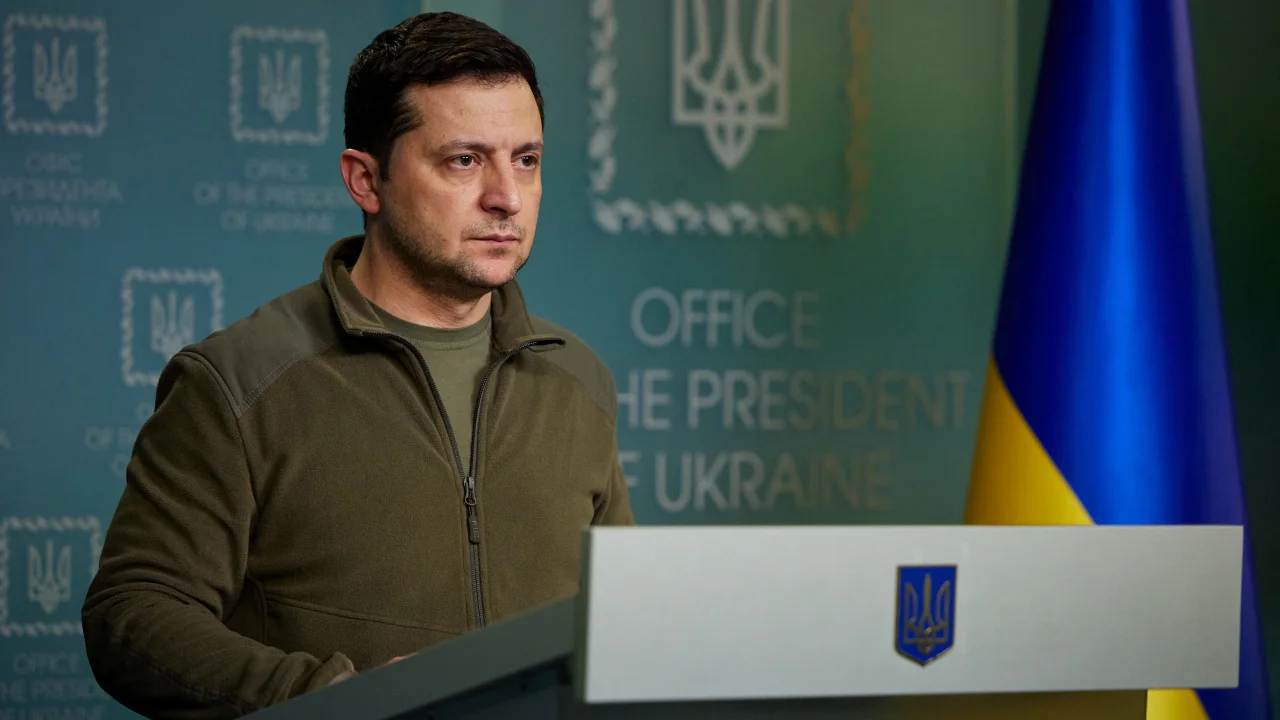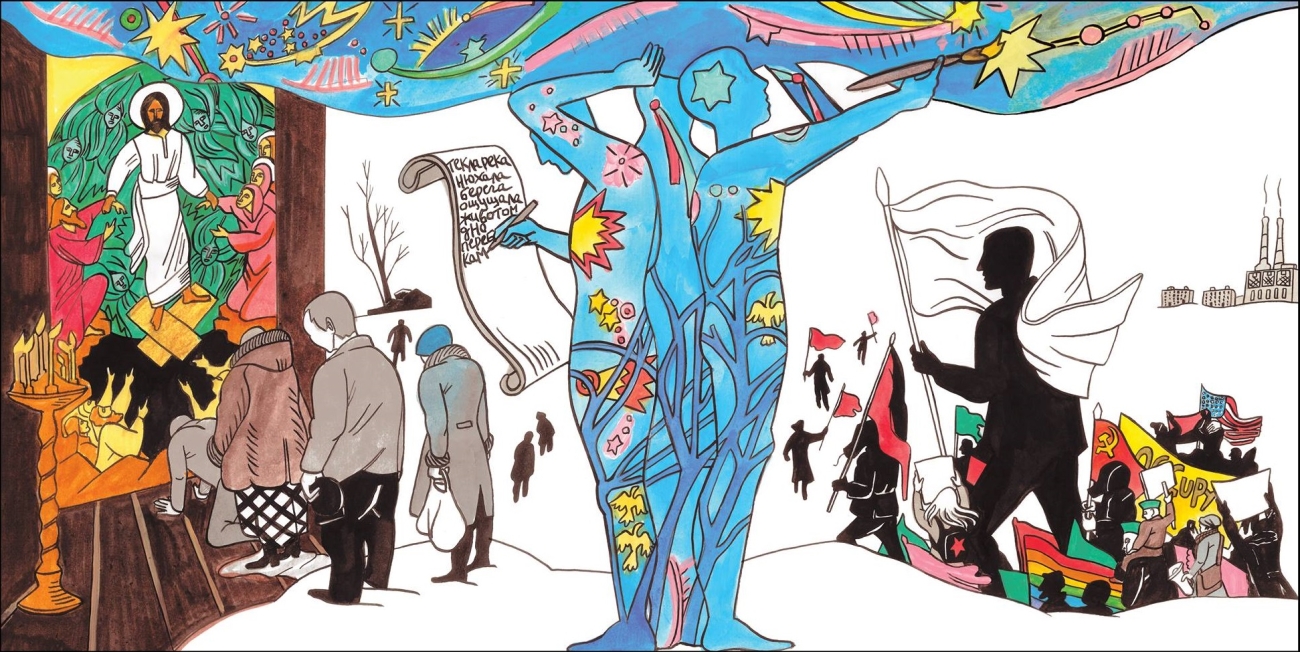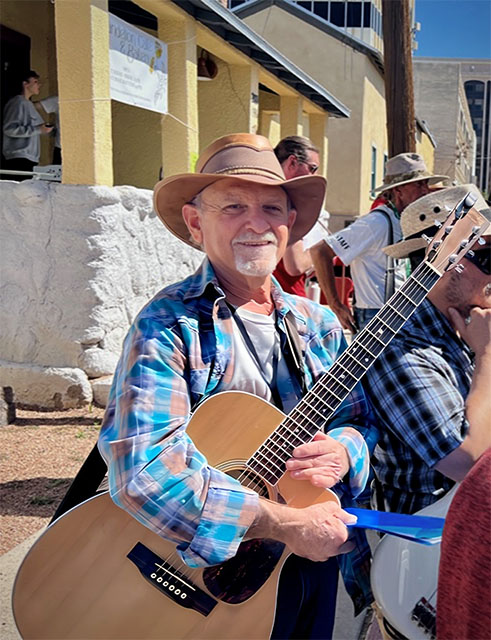Dan Oved
Dan is a singer-songwriter from Tucson, Arizona whose Jewish ancestors escaped persecution in Ukraine in the early 20th century. Inspired by Zelensky's strength and courage, Dan has translated the theme song from Zelensky's famous TV show, Servant of the People. He has also crafted an extra verse to honor the President and bring his life story up to date.

Servant of the People - Lyrics
I do dearly love my land.
Do dearly love my wife
Do dearly love my puppy.
I'm a product of my clan
I'm almost super man.
I rarely fight unfairly
Everyone knows
How my fate goes.
Servant of the people.
I have everything I need.
My dignity esteem,
even shouts of bravo
I've an airplane of my own.
For me and me alone.
but why? not cause I want to
and on my chest
a tattoo rests
Servant of the people.
Now the Fates have had their say
And what was just a play
is all too real as bombs sound.
I'm the one who leads the way.
I'll fight and I will pray
pray my people hold their ground
and through the pain.
I shall remain
Servant of the people.
Dan's Artist Statement
My name is Dan Oved and I’m from Tucson, Arizona.
That’s a long way from Ukraine, but I’d like to explain my connection to Ukraine and it’s President and my concern and wonder about what is transpiring in Ukraine this very day.
Both sides of my family came from Odessa, Ukraine in the early 20th century. My grandparents were teenagers when they left Ukraine to escape pogroms that targeted Jewish people. Their story is quite similar to the story told in Fiddler On The Roof: they were steeped in Jewish tradition, but forced to adapt to changing times and, ultimately, forced to leave to avoid the oppression perpetrated by Russian soldiers. Their family names were Oiwidowicz, and Yellen on my father’s side and Greenberg and Oransky on my mother’s side. When my paternal grandfather’s ship, the SS Uranium, landed in Ellis Island in NYC, his name was Moische Oiwidowicz. That got quickly changed to Morris Ovedovitz. Two of my uncles later shortened their name to Oved, and I followed suit when I started performing as a singer-songwriter.
Volodymyr Zelensky, Ukraine’s first Jewish president, has also roots that go back many years in Ukraine. His grandfather was the only survivor of 4 brothers who fought the Nazis in Ukraine during World War II. He identifies as an Ashkenazi Jew, as do I. The Ashkenazi Jews emigrated from the Roman Empire in the first millennium CE. Their main language was Yiddish, an offshoot of German.
When I was growing up, I was told that my grandparents came from Russia. There was no distinction made for the fact that Ukraine had its own culture, and was not, merely, a portion of Russia. Some of my relatives spoke Russian as a second (or third) language. I only began to question the way I was taught about my ancestry when Ukraine declared its independence from Russia, after the break-up of the Soviet Union. When Russia began the shelling of Ukraine, in 2022, my interest in the area just grew. The fact that Zelensky’s heritage paralleled my own and that Russian attempts at domination of Ukraine has had such a long history, made this a story I felt deeply.
Zelensky was an actor and comedian before becoming President. From 2015 to 2019, he starred in a Ukrainian show, entitled “Servant Of The People”. In the show, he is a teacher
whose anti-corruption screed is secretly videotaped. It goes viral, and he is propelled to the position of President. I found it amazing that his real life would so closely parallel this story
line, with him becoming the actual President just shortly after the show ran its last episode. So I was compelled to watch the show when it ran on Netflix. The show was in Russian, with English subtitles. It starts with a song, “Servant Of The People” sung in Russian, with a catchy Eastern European melody and feel. I decided I would try to sing the song in English. I looked around for translations of the words and found a few, but there were differences in interpretations. I had to take the best from each translation and, at times, diverge altogether to come up with an English language version of the song that I was satisfied with. I noted that Zelensky was truly, in the real world, a “servant of the people”. So, I decided to write a verse of my own, to make the song reflect the reality of the present day.
The song I have come up with is meant to honor Zelensky, to acknowledge the interplay of fantasy and reality and to bring to people’s attention the seemingly never-ending desire of one group of people to impose their will upon another and to honor the resistance to that.

